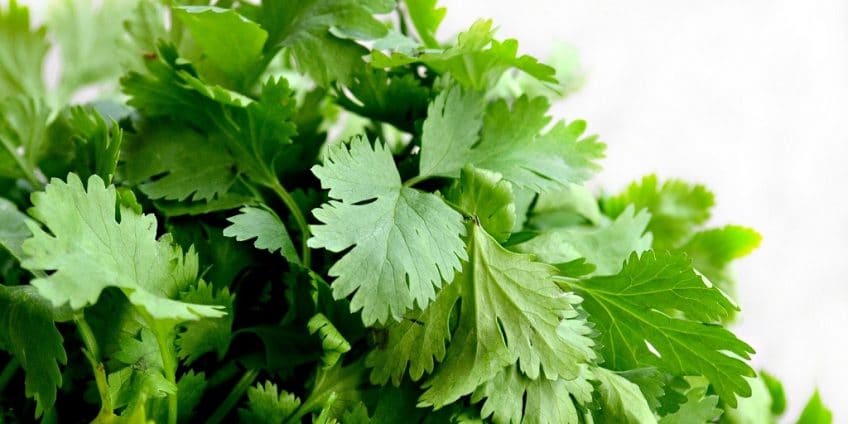Scroll to Recipes with Coriander / धनिया as ingredient
Coriander belongs to the plant family of Apiaceae. Other names for it are Chinese parsley, dhania, or cilantro. The stem, leaves, and seeds are more used in cooking, even if all the parts are edible.
As per some research, gene detects specific aldehydes, which use odorant substances in soaps and detergents.
Commonly Known As
| Language | Name | Written as |
|---|---|---|
| Arabic | kazbira | كزبرة |
| Bengali | Dhanē | ধনে |
| Gujarati | Kothmir | કોથમીર |
| Hindi | dhaniya | धनिया |
| Kannada | Kottambari | ಕೊತ್ತಂಬರಿ |
| Malayalam | malli | മല്ലി |
| Marathi | Kōthimbīra | कोथिंबीर |
| Punjabi | Dhanī’ā | ਧਨੀਆ |
| Tamil | Kottamalli | கொத்தமல்லி |
| Telugu | Kottimīra | కొత్తిమీర |
| Urdu | dhaniya | دھنیا |
Nutritional Profile of Coriander
Nutritional profile per 100 gms
- Calories: 23
- Protein: 2.1g
- Carbohydrate: 3.7g
- Fiber: 2.8g
- Fat: 500mg
- Sodium: 46mg
- Potassium: 521mg
Source: USDA & Google
Benefits Of Coriander
Here are some of the critical benefits of having coriander in your daily diet.
Keeps Cholesterol In Control
Coriander has few acids present in it. Ascorbic acid, oleic acid, stearic acid, palmitic acid, and linoleic acid, all these acids are beneficial in reducing cholesterol in our body. These acids prevent the deposition of cholesterol over the walls of arteries and veins. Hence, through this, it also ensures the prevention of chronic heart diseases like heart attack. It helps prevent serious health issues likewise.
Preventing Allergies
Coriander is an efficient culinary herb for treating specific allergies and hay fever. It also prevents the skin from infections and hives, throat swelling, and anaphylaxis stays away as well.
Great For Skin Inflammation
Cineole is a compound present in coriander and helps prevent inflammatory problems. This compound also has antirheumatic and antiarthritic properties, and thus it reduces problems like kidney disorders, anemia, arthritis, etc. Coriander helps to remove toxins from your body as well. It makes body health and skin healthy too.
Health Of Bones
Coriander is excellent in calcium and other components that are useful for the health of bones. Especially the centre of the leaf that has the most concentration of calcium. It helps with the symptoms of osteoporosis and those diseases that affect bone strength and overall health.
Blood Pressure Maintenance
Hypertension is the result of high blood pressure. And as per research, coriander is very helpful in reducing and maintaining blood pressure. And as a result, it also reduces the risk of some cardiovascular issues, and heart attack since the tension from blood vessels is dissipated.
Prevents Anemia
Along with calcium, coriander is also rich in iron which is required for people who are anemic. Coriander is thus, good for preventing anemia. It also prevents short breath, fatigue, an increase in heart rate, and abnormal cognitive functions.
Decreasing Cardiovascular Problems
The essential oils, dietary fibres, calcium, vitamins, and antioxidants present in coriander helps in increasing the good cholesterol levels in the body and decrease harmful cholesterol levels. It reduces the pressure and tension on the heart arteries and benefits people suffering from heart problems, atherosclerosis, and other cardiovascular problems.
Side Effects Of Coriander
Though the consumption of coriander causes no noticeable side effects, some people have skin irritation, and their skin was prone to sunburn. Moreover, without consulting the doctor, pregnant ladies should avoid access consumption of it.
Frequently Asked Questions
Let us answer some of the common questions about coriander.
Are cilantro and coriander different?
Both are seemingly the same as it comes from the same plant. The leaves and stems of this plant are internationally known as coriander, and the seeds are called “coriander seeds”. The plant and stem are identified as cilantro in the US, whereas the seeds are known as coriander seeds.
Can you replace coriander with something else?
Dill, parsley, tarragon, or the combination of all three can replace coriander.
Are coriander and parsley the same?
No, they are not, as they both differ in taste. Coriander tastes pungent and has a slightly stronger flavour from parsley. Parsley is milder. Moreover, it has more sharp notches and has deep green colour in comparison to parsley.

